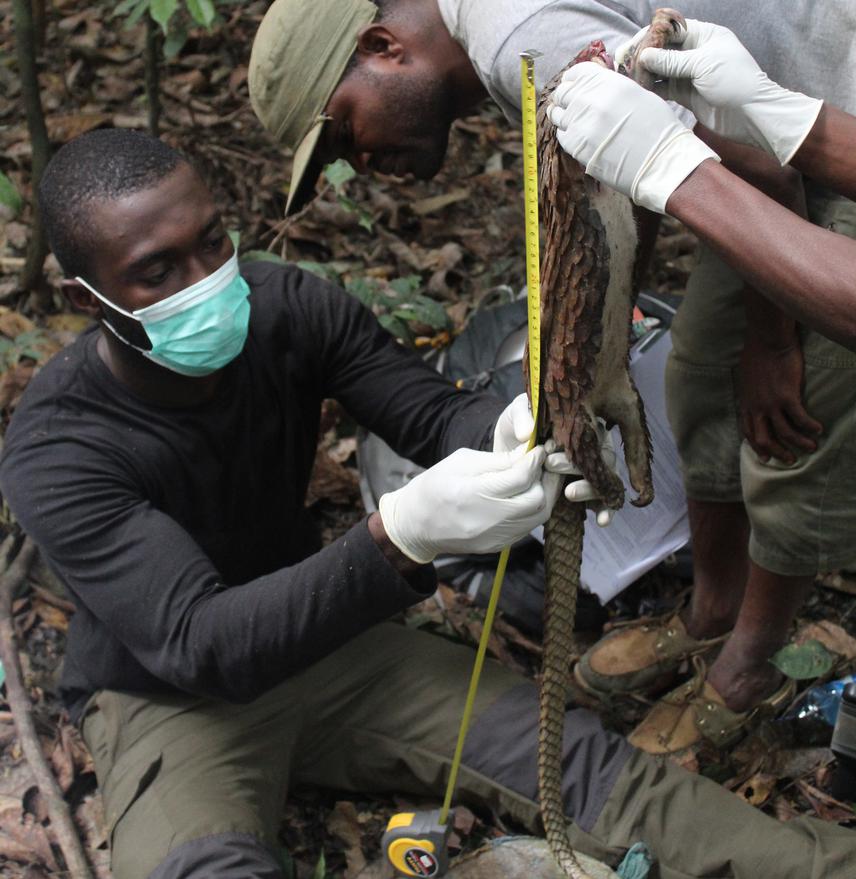Charles Agbor Emogor
Pangolins are among the most heavily threatened, yet least understood mammals on earth. Working in and around Cross River National Park (CRNP), Nigeria, my project will integrate both ecological and socio-economic methods to generate badly needed information to reduce pangolin decline and improve their management. Specific objectives of this project include to: a) estimate the home range size of the white-bellied pangolin (WBP); b) quantify pangolin off-take from the CRNP; c) implement a community-based intervention to reduce pangolin poaching and d) support the formulation of an evidence-based system to identify the geographic origin of seized pangolin (and derivatives). The conservation needs this project has identified include; the creation of an area-based management plan for the WBP which is currently lacking; understanding of the sustainability of the current harvest levels of pangolins (this will include the black-bellied pangolin, Phataginus tetradactyla) and to identify sources of poached pangolins to improve their protection.

The WBP recently got reclassified from Vulnerable to Endangered to reflect the increasing threats to their survival, which includes habitat loss and overexploitation. Numerous studies have recorded large quantities of the WBP in wildmeat markets and confiscations made at national and international borders. Regrettably, efforts to conserve P. tricuspis are hampered by extremely limited knowledge about their ecology, the distribution of remaining populations and the dynamics of the pangolin trade. However, relative to other African pangolin species, they are the most common, occurring at relatively high densities in suitable habitats, such as the CRNP which has been identified as one of the most important sites for pangolin conservation in Nigeria. Amongst other objectives, this project will provide information on the area requirements of the WBP which will help practitioners and policymakers establish an area-based management plan for this species and provide invaluable insights into the sustainability of their current extraction. Additionally, this project will support pangolin conservation by building evidence for addressing their trade and will help curb the species’ decline by mobilizing local hunters to work as pangolin guardians and whistle-blowers.
This project will use telemetry to collect information on the ranging behaviour of the WBP after monitoring 10 adult pangolins for 4 months. The provision of evidence to address the global illegal pangolin trade will be possible through an ongoing collaboration with researchers at the Centre for Conservation Biology (CCB), University of Washington. My role involves collecting pangolin samples such as scales and faeces from the CRNP and environs, which will be analysed for their DNA. DNA will then be used to support forensic evidence to identify the geographic source of poached pangolin when shipments are confiscated. Although focused on the white-bellied pangolin, this project will also collect data on the black-bellied pangolin for forensic investigation and understanding offtake in Oban and the Okwangwo Division of the CRNP. The results from this exciting project will undoubtedly help develop more effective conservation strategies for pangolins and other similarly Endangered species in Nigeria. This will be the first pangolin-centred project in Cross River (my home region), which, given Nigeria’s pre-eminent role in the pangolin trade, underscores the importance and timeliness of the work.